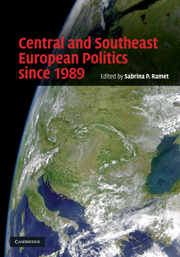Book contents
- Frontmatter
- Contents
- List of figures and maps
- List of tables
- Notes on the contributors
- Preface
- List of acronyms and abbreviations
- Guide to pronunciation of Central and Southeast European words
- 1 Central and Southeastern Europe, 1989
- 2 Central and Southeastern Europe, 2009
- Part 1 Introduction
- Part 2 Issues
- 3 The emergence of the nation-state in East-Central Europe and the Balkans in historical perspective
- 4 Central and East European party systems since 1989
- 5 Economic reforms and the illusion of transition
- 6 The War of Yugoslav Succession
- Part 3 Central Europe
- Part 4 Yugoslav Successor States
- Part 5 Southeastern Europe
- Part 6 Former Soviet republics
- Part 7 Present and future challenges
- Index
- References
3 - The emergence of the nation-state in East-Central Europe and the Balkans in historical perspective
Published online by Cambridge University Press: 05 June 2012
- Frontmatter
- Contents
- List of figures and maps
- List of tables
- Notes on the contributors
- Preface
- List of acronyms and abbreviations
- Guide to pronunciation of Central and Southeast European words
- 1 Central and Southeastern Europe, 1989
- 2 Central and Southeastern Europe, 2009
- Part 1 Introduction
- Part 2 Issues
- 3 The emergence of the nation-state in East-Central Europe and the Balkans in historical perspective
- 4 Central and East European party systems since 1989
- 5 Economic reforms and the illusion of transition
- 6 The War of Yugoslav Succession
- Part 3 Central Europe
- Part 4 Yugoslav Successor States
- Part 5 Southeastern Europe
- Part 6 Former Soviet republics
- Part 7 Present and future challenges
- Index
- References
Summary
The “longue durée” of political history
The emergence of the nation-state appeared as a political process of “longue durée” in the political history of East-Central Europe and the Balkans. Alongside this, the multinational states constituted by the USSR, Czechoslovakia, and Yugoslavia, seem to have taken historical detours, lasting seventy-four years for the Soviet Union (1917–91), seventy-five years for Czechoslovakia (1918–93), and seventy-three years for Yugoslavia (1918–91). Much as the division of politics into two camps (left and right) harkens back to the French Revolution and represents the “longue durée” of European political history, the appearance of civic nationalism in France and ethnic nationalism in Germany, more or less at the same time (the nineteenth century), represents the ideological source that nourished the creation of new states of East-Central Europe. In this sense, I consider the formation of these nation-states, spread over several centuries, to be of the “longue durée,” even if this concept is rarely used in political history.
At this point in time it is somewhat surprising that the emergence of nation-states in East-Central Europe and the Balkans, after the fall of the communist regimes, appeared as both extraordinary and undesirable to Western democracies, despite the fact that the nation-state, as François Furet has justly noted, “is the principal form within which modern societies live and the basis upon which they think they should evolve.” Jean-Baptiste Duroselle says the same in writing that, in the twentieth century, “every political entity seeks to become a nation-state.”
- Type
- Chapter
- Information
- Central and Southeast European Politics since 1989 , pp. 39 - 63Publisher: Cambridge University PressPrint publication year: 2010



